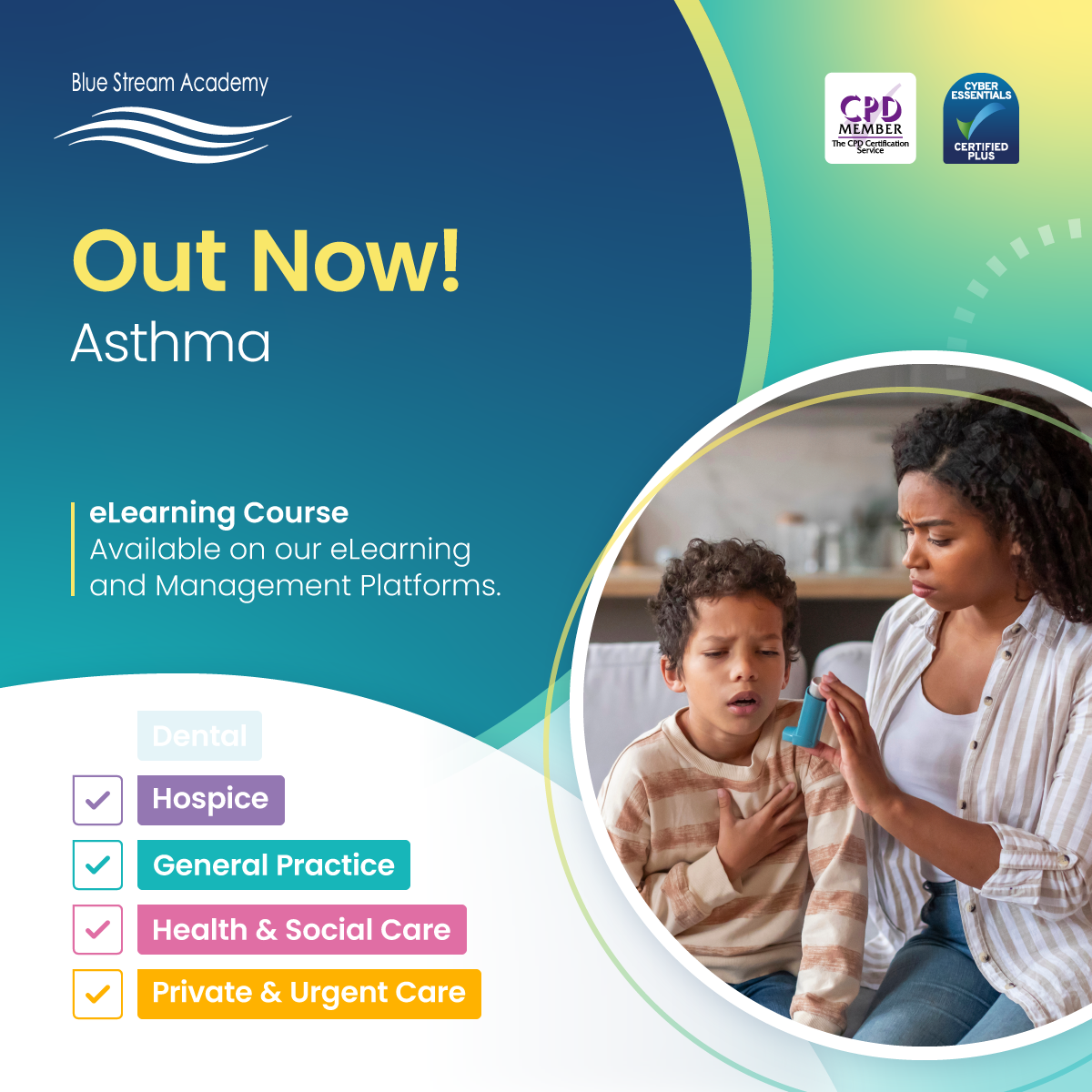29/08/2024 10:47:38
Asthma Training for Healthcare Professionals | Now Available

Blue Stream Academy is pleased to announce the release of a new Asthma training module for healthcare professionals.
This module is now available on the GP, Health and Social Care, Hospice, and Private and Urgent Care eLearning and Management Platforms.What is Asthma?
Asthma is a long-term condition, chronic respiratory condition caused by inflammation of the airways in the lungs. If affects people of all ages and often starts in childhood, although it can develop for the first time in adults. There is currently no cure, but there are things that can be done to help keep symptoms under control.
Respiratory conditions can have a significant impact on a person and wider health service. Health and social care professionals face challenges in diagnosis, treatment, and effective education for self-management.
Respiratory Conditions
Respiratory disease represents a significant economic burden to the individual, to the health service, and to society. This burden is a consequence of disability, premature mortality, direct medical resource use (including drug costs), and indirect costs.
"Lung conditions are the third biggest killer in the UK, yet too little is being done to prevent, treat, and cure them." Asthma and Lung UK
“Asthma affects more than 300 million people worldwide, including 11.6% of children and young people aged 6-7 years.” NICE
Characteristics of Asthma
Asthma presents with symptoms such as coughing, wheezing, shortness of breath, a feeling of tightness in the chest, and difficulty breathing, along with fluctuating limitations in airflow during exhalation. These symptoms can change in severity and frequency over time. Triggers include physical activity, exposure to allergens or irritants, weather changes, and viral infections. Symptoms may improve on their own or with treatment, and can occasionally be absent for extended periods, ranging from weeks to months.
Asthma Causes
Many factors have been associated with an increased risk of asthma; however, the exact cause of asthma is unknown.
There are some things that can increase a person’s risk of developing asthma which include (but are not limited to):
- Having an allergy-related condition, such as eczema, a food allergy or hay fever - these are known as atopic conditions.
- Having a family history of asthma or atopic conditions.
- Having had bronchiolitis - a common childhood lung infection.
- Exposure to tobacco smoke as a child.
- The person’s mother smoking during pregnancy.
- Being born prematurely (before 37 weeks) or with a low birth weight.
- Some people may also be at risk of developing asthma through their job.
Source: Asthma NHS 2021
Diagnosing Asthma
A diagnosis of asthma should be suspected in a person with wheeze, breathlessness, chest tightness, and cough, particularly if the symptoms are worse at night and in the early morning. Asthma should also be suspected if symptoms occur in response to exercise, allergen exposure, cold air, non-steroidal anti-inflammatory drugs, beta-blockers, or occur in the absence of an upper respiratory tract infection.
Potential diagnosis order could include:
- gathering information on the patients’ symptoms, triggers and medical history
- observations to ensure that testing is safe
- undertaking a FeNO (fractional exhaled nitric oxide) test
- undertaking a spirometry test
- and utilising other takes such as bronchodilator reversibility (BDR), peak expiratory flow (PEF) readings, and direct bronchial challenge testing with histamine and methacholine.
Managing Asthma
With good asthma care, treatment and management, service users can live normal, active lives.
Asthma treatments include controlling symptoms with inhalers, allowing a person to breath in medicine to relieve symptoms and side effects when they occur through (reliever symptoms) or stop symptoms developing and prevent asthma attacks (preventer inhalers). Alongside reliever and preventer inhalers, combination inhalers combine two kinds of medicine in one device: a corticosteroid preventer and a long-acting bronchodilator.
What does the Asthma eLearning module cover?
Our asthma healthcare training module has been created to support health and social care professionals by providing comprehensive information on asthma. It covers the accurate diagnosis of the condition, the prevalence and pathophysiology, inflammatory responses, and important considerations for clinical judgment.
The module also addresses symptom management, trigger and risk factor identification, treatment options including inhalers, and guidance on developing self-management plans. Additionally, it offers insights on managing acute asthma attacks and how health and social care professionals can assist in achieving complete control of the condition, alongside the asthma nice guidelines for follow-up care.
This healthcare-specific training module is suitable for use as a GP training resource, a hospice training resource, a social care training resource, and a private and urgent care healthcare training resource.
Click here to request further information on Blue Stream Academy’s eLearning for healthcare professionals.